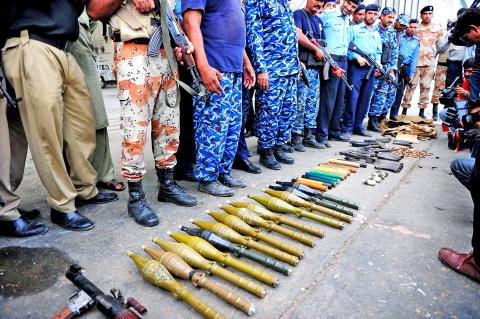Taliban militants disguised as security forces stormed Pakistan’s busiest airport on Sunday and at least 27 people were killed in a night-long battle at one of the country’s most high-profile targets.
The assault on Jinnah International Airport in Karachi, Pakistan’s sprawling commercial hub of 18 million people, all but destroys prospects for peace talks between the Pakistani Taliban and the government of Pakistani Prime Minister Nawaz Sharif.
It also deals a heavy blow to Sharif’s efforts to attract foreign investors to revive economic growth and raises questions about security at the country’s main installations.

Photo: AFP
The attack began just before midnight, when 10 gunmen wearing military uniforms and armed with automatic rifles and rocket-propelled grenades shot their way into the airport’s old terminal, which is used mainly for charter and executive flights.
Gun battles raged through the night until security forces regained control of the airport at dawn. Passengers were evacuated and all flights were diverted.
The military’s media director-general Asim Bajwa said the airport had been cleared and would soon resume operations.
The government said security was being stepped up at all airports.
“We need to keep extremely vigilant,” Shujaat Azeem, special assistant to Sharif on aviation, said in a statement.
The Pakistani Taliban, an alliance of insurgent groups fighting to topple the government and set up a Shariah state, said they carried out the attack in response to air strikes on their strongholds near the Afghan border and suggested their mission was to hijack a passenger plane.
“It is a message to the Pakistan government that we are still alive to react over the killings of innocent people in bomb attacks on their villages,” Taliban spokesman Shahidullah Shahid said.
Pakistan’s paramilitary force said that the attackers were ethnic Uzbeks. Pakistani officials often blame foreign militants holed up in lawless areas on the Afghan border for staging attacks alongside the Pakistani Taliban around the country.
The death toll included airport security guards and workers with Pakistan International Airlines.
In a separate unrelated attack, at least 22 Shiite pilgrims were killed in a suicide attack near Pakistan’s border with Iran, a local official said.
A radical Sunni group claimed responsibility for the attack.
Karachi is Pakistan’s biggest city and commercial hub, home to a vibrant stock exchange, the central bank and the country’s main port.
However, it is also a violent and chaotic place where Taliban militants and criminal gangs operate freely underground.
At the airport, gunbattles went on for five hours and television pictures showed fire raging as ambulances ferried casualties away.
At least three loud explosions were heard as militants wearing suicide vests blew themselves up.
By dawn yesterday, the army said the airport had been secured, but heavy smoke rose above the building.
“Ten militants aged between 20 and 25 have been killed by security forces,” a spokesman for the Rangers said. “A large cache of arms and ammunition has been recovered from the militants.”
“A sweep operation is being carried out at the airport, which is expected to be completed by midday,” he added.

The US government has signed defense cooperation agreements with Japan and the Philippines to boost the deterrence capabilities of countries in the first island chain, a report by the National Security Bureau (NSB) showed. The main countries on the first island chain include the two nations and Taiwan. The bureau is to present the report at a meeting of the legislature’s Foreign Affairs and National Defense Committee tomorrow. The US military has deployed Typhon missile systems to Japan’s Yamaguchi Prefecture and Zambales province in the Philippines during their joint military exercises. It has also installed NMESIS anti-ship systems in Japan’s Okinawa

TRAGEDY STRIKES TAIPEI: The suspect died after falling off a building after he threw smoke grenades into Taipei Main Station and went on a killing spree in Zhongshan A 27-year-old suspect allegedly threw smoke grenades in Taipei Main Station and then proceeded to Zhongshan MRT Station in a random killing spree that resulted in the death of the suspect and two other civilians, and seven injured, including one in critical condition, as of press time last night. The suspect, identified as a man surnamed Chang Wen (張文), allegedly began the attack at Taipei Main Station, the Taipei Fire Department said, adding that it received a report at 5:24pm that smoke grenades had been thrown in the station. One man in his 50s was rushed to hospital after a cardiac arrest

‘WIN-WIN’: The Philippines, and central and eastern European countries are important potential drone cooperation partners, Minister of Foreign Affairs Lin Chia-lung said Minister of Foreign Affairs Lin Chia-lung (林佳龍) in an interview published yesterday confirmed that there are joint ventures between Taiwan and Poland in the drone industry. Lin made the remark in an exclusive interview with the Chinese-language Liberty Times (the Taipei Times’ sister paper). The government-backed Taiwan Excellence Drone International Business Opportunities Alliance and the Polish Chamber of Unmanned Systems on Wednesday last week signed a memorandum of understanding in Poland to develop a “non-China” supply chain for drones and work together on key technologies. Asked if Taiwan prioritized Poland among central and eastern European countries in drone collaboration, Lin

ON ALERT: Taiwan’s partners would issue warnings if China attempted to use Interpol to target Taiwanese, and the global body has mechanisms to prevent it, an official said China has stationed two to four people specializing in Taiwan affairs at its embassies in several democratic countries to monitor and harass Taiwanese, actions that the host nations would not tolerate, National Security Bureau (NSB) Director-General Tsai Ming-yen (蔡明彥) said yesterday. Tsai made the comments at a meeting of the legislature’s Foreign Affairs and National Defense Committee, which asked him and Minister of National Defense Wellington Koo (顧立雄) to report on potential conflicts in the Taiwan Strait and military preparedness. Democratic Progressive Party (DPP) Legislator Michelle Lin (林楚茵) expressed concern that Beijing has posted personnel from China’s Taiwan Affairs Office to its